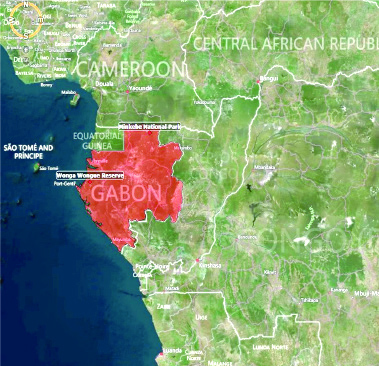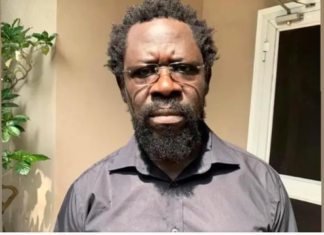• British soldiers arrive to help fight elephant poaching
• Tourism can reduce economy’s dependence on aging oil fields
Gabon’s Ali Bongo Ondimba wants the world to know he’s serious about wildlife conservation.
The president of the densely forested Central African nation made his private helicopter available so that United States Trade Representative, Michael Froman, could see forest elephants and even a rare pangolin in one of the nation’s flagship state parks, the Wonga Wongue Reserve.
Bongo is hoping to use the country’s wildlife sanctuaries to build a tourism industry.
Froman, who visited Gabon to speak about trade between the U.S. and Africa, said the U.S. is committed to curbing Asian demand for poached ivory.
His tour of the nature reserve highlighted a push by Bongo to step up conservation efforts in a country that’s home to 70 per cent of Central Africa’s remaining forest elephants.
In September 2015, Bongo invited 12 British soldiers to teach park rangers in the northeastern Minkebe National Park surveillance techniques to stop poachers, Omer Ntougou, the spokesman of the National Parks Agency, said.
In 2014, the U.S. Pentagon provided basic patrol and riverine training to a specialised law enforcement unit in Gabon with responsibility for protecting the country’s national parks, spokeswoman Army Lieutenant Colonel Valerie Henderson said in an e-mailed statement.
Bongo wants to attract ecotourists to Gabon’s tropical forests to reduce the country’s dependence on oil.
Crude from its aging oil fields accounts for about 80 per cent of export revenue, and the government is struggling with an almost 50 per cent slump in crude prices in the past year.
Gabon will probably cut spending and adjust its budget because of the decline, Minister of Energy, Desire Guedon, said.
Gabon is the only country in the region that has managed to reverse the decline of elephant populations in some national parks, according to Michael Fay, an American conservationist who has helped create a wildlife protection strategy for Africa’s least densely populated nation.
Tougher stance
“Gabon has taken a tougher stance on wildlife issues, especially illegal wildlife trade,” Fay, who serves as a presidential adviser, told reporters. Rangers in Wonga Wongue haven’t found any poached elephant carcasses in almost a year, he said.
Central Africa’s forest elephants are being decimated by poachers, who are cashing in on high Asian demand for ivory.
More than 85 per cent of ivory from forest elephants seized worldwide between 2006 and 2014 has been traced to a vast forest spanning parts of Cameroon, Republic of Congo and Gabon, according to a University of Washington study.
Nearby war-torn Central African Republic is the scene of rampant poaching as combatants trade illicit ivory for arms and fuel, according to Enough Project, a rights group based in Washington.
The government has signed partnerships to protect wildlife with oil and logging companies, including the China Petroleum & Chemical Corp., which is known as Sinopec and operates in the Wonga Wongue Reserve, said Fay.
In 2002, Fay persuaded Bongo’s father, Omar Bongo, to create 13 national parks in areas that Fay had identified as important wildlife habitats.
Bongo ruled the country for 41 years until his death in 2009.
Oil partners
“At first, many companies were reluctant to engage with us, but the government has been helpful in setting new standards and enforcing them,” said Fay.
Critics, including Marc Essangui, are skeptical about the government’s intentions.
Essangui heads the non-governmental organisation, Brainforest, whose protests against a Chinese mining project led to its suspension in 2007.
“The Bongos plundered our country and are even in the process of selling our ancestral forests,” he said in speech at the Oslo Freedom Forum in Norway last year.
In 2014, Gabon banned commercial fishing in almost a quarter of its territorial waters.
The ban covers 18,000 square miles (29,000 square kilometres) and is meant to protect 20 species of whales and dolphins, as well as the world’s largest breeding population of leatherback turtles.
Gabon is “a bright spot in the fight against wildlife trafficking,” Froman said on his website.
• Culled from www.bloomberg.com












